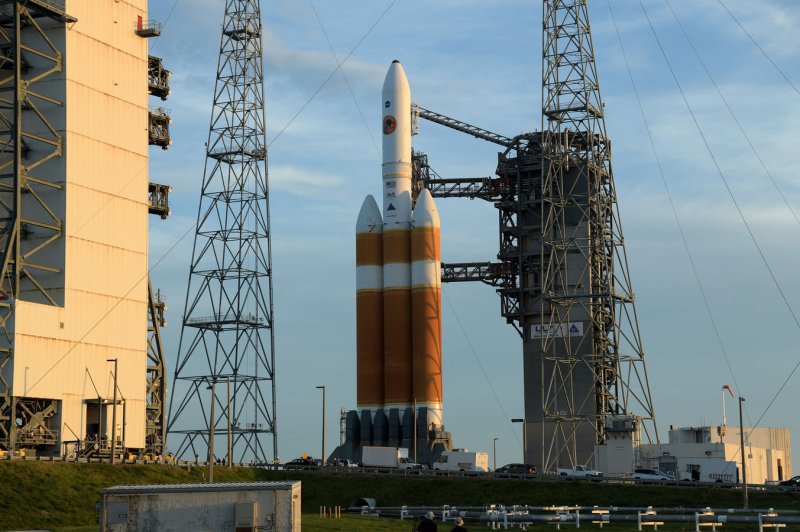SpaceX delayed the launch of a Falcon 9 rocket from Launch Complex 40 at the Cape Canaveral Air Force Station in Florida by one day to allow for the replacement of parts in one experiment aboard the Dragon cargo ship. Photo by Joe Marino-Bill Cantrell/UPI |
License Photo
Dec. 4 (UPI) -- SpaceX delayed the launch of a resupply mission to the International Space Station in order to replace food bars for a rodent investigation, one of more than 20 experiments going to the ISS.
The Falcon 9 rocket launch, now scheduled for 1:16 p.m. EST Wednesday from Cape Canaveral, will shepherd the company's Dragon cargo ship into space just days after the arrival of three new crew members for the ISS.
The launch would have been SpaceX's second in 24 hours after the company sent 64 miniature satellites into orbit on Monday, a new record, from Vandenberg Air Force Base in California.
"The launch was moved to Wednesday after mold was found on food bars for a rodent investigation prior to handover to SpaceX," NASA said in a blog post. "Teams will use the extra day to replace the food bars."
Dozens of science experiments, organized by both NASA and the ISS National Lab, are packed into the cargo ship, as are supplies and equipment for crew members aboard the space station. The payload weighs more than 5,600 pounds.
One of the new science tools being carried to ISS is a space laser designed to help scientists build a 3D map of Earth's temperate and tropical forests. The so-called Global Ecosystem Dynamics Investigation will help climate scientists more accurate quantify the effects of deforestation on global carbon emissions.
Researchers are also sending microscopic worms to the space station to study muscle loss. The experiment could inspire new therapies for muscular dystrophy and diabetes.
Several startup companies have experiments traveling to the space station thanks to the work of ISS National Lab.
One of those experiments is designed to test the efficacy of a wound-healing technology. The investigation was designed by Elaine Horn-Ranney and her biomedical company Tympanogen. The space station's microgravity environment will allow Horn-Ranney to precisely measure the ability of her novel hydrogel to promote healing and fend off infection-causing bacteria.
ISS National Lab also works with other federal agencies to locate experiments that might benefit from a microgravity environment. One of these is a tissue chip project designed by Sonja Schrepfer, a researcher from the University of California, San Francisco. Schrepfer's investigation aims to measure the impacts of microgravity on the human immune system.
"The chip experiments feature small microscope-sized devices, slides measuring 1 by 3 inches or so, that can be populated with different human cell types," Michael S. Roberts, deputy chief scientist at ISS National Lab, told UPI last month. "If you create the right environment and feed the cells the right stuff, you can guide them into behaving like specific human tissues and even whole organs."
The 2,200 pounds worth of experiments, in addition to tools and supplies, will arrive two days after a trio of new astronauts were welcomed to the space station. The new crew members will assist in the docking of the Dragon cargo ship.















